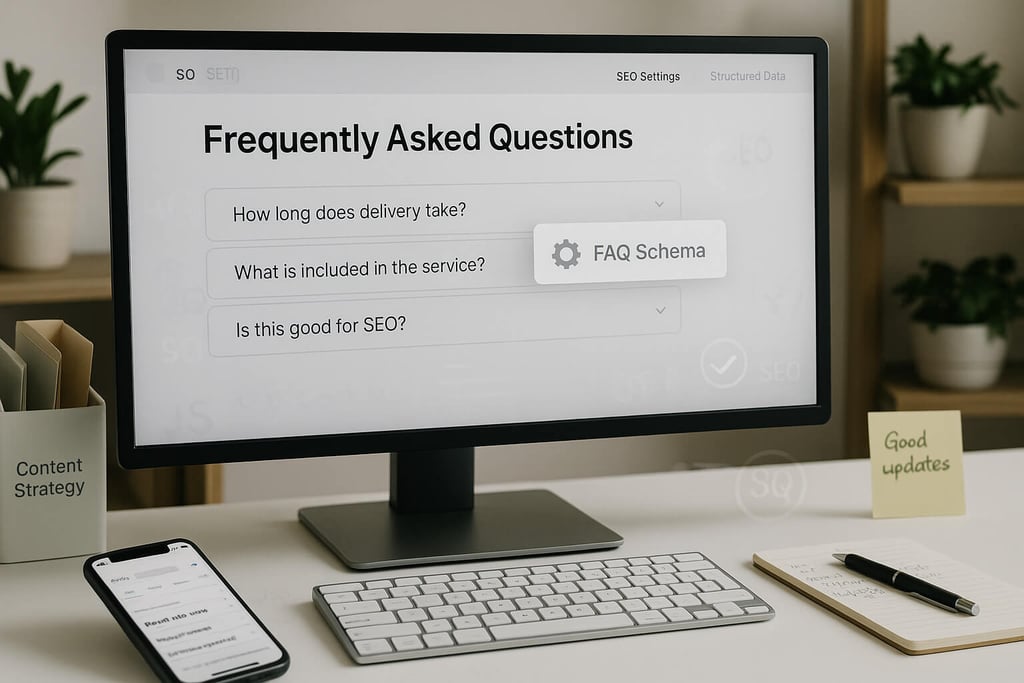SEOJet Flight Blog
FAQ Page SEO: Best Practices, FAQs Schema & Optimisation
Boost search engine rankings with an optimised FAQ page. Learn SEO best practices, implement FAQ schema, and improve user experience. Help SEO now!
TECHNICAL SEO
Ardene Stoneman
5/14/20256 min read


How to Optimise Your FAQ Page for SEO: Best Practices and Benefits
A well-structured FAQ page isn’t just helpful for your customers - it can also be great for SEO.
By addressing common questions in a clear, structured format, you can improve your website’s visibility, support your content strategy, and help search engines understand your content better.
This article explains why a good FAQ page is useful, how to build one that performs, and what SEO best practices to follow.
Outline of Article
What Is an FAQ Page and Why Does It Matter?
Are FAQ Pages Good for SEO?
What Are the Best Practices for Building an FAQ Page?
What Questions Should You Include on Your FAQ Page?
How Do You Make an SEO-Friendly FAQ?
Should You Add FAQ Schema to Your Page?
What Is the Role of FAQ Schema Markup in Search Rankings?
Where Should You Place Your FAQ Section?
How Can FAQ Pages Improve User Experience?
Do You Need a Dedicated FAQ Page or Inline FAQ Sections?
How Can FAQs Support Your Internal Linking Strategy?
What Mistakes Should You Avoid with FAQ Pages?
How to Use Keyword Research to Write FAQs
What Are the Signs of a Good FAQ Page?
How Can You Measure the SEO Impact of Your FAQs?
1. What Is an FAQ Page and Why Does It Matter?
An FAQ page - or frequently asked questions page - is a structured list of questions and answers designed to provide useful information to website visitors.
The aim of an FAQ page is to provide answers to common questions related to your product, service, or business.
A good FAQ page helps people find the information they need without searching through multiple content pages. It improves usability and reduces customer support queries.
But that’s not all. A well-built FAQ section can help your local business website rank higher in search by aligning with how people phrase their search queries.
2. Are FAQ Pages Good for SEO?
Yes, FAQ pages can help with SEO in several ways:
They include natural keyword phrases based on real search questions.
They add depth and clarity to your content.
They can appear directly in the search results page if enhanced with FAQ schema.
A well-structured FAQ page helps search engines understand the content of your site better. It contributes to your overall SEO by improving your visibility for long-tail search terms and driving more traffic to your website.
3. What Are the Best Practices for Building an FAQ Page?
When building an FAQ, start with a clear structure. Group related questions, avoid repetition, and use formatting that’s easy to scan. Here are some best practices:
Use headers for each question.
Provide short, clear answers.
Keep language direct and user-focused.
Avoid unnecessary jargon or sales speak.
Include internal links to relevant pages on your website.
The goal of an FAQ is to provide the best answers in the simplest way possible. It’s not about writing long-form explanations. Keep each entry focused and specific.
4. What Questions Should You Include on Your FAQ Page?
Start by identifying commonly asked questions about your business. These could come from:
Customer support queries
Search engine results
Sales conversations
Tools like Google Search Console or AnswerThePublic
Think about the questions people are asking before they buy, while they buy, and after they’ve bought. These questions might cover delivery, returns, pricing, features, or service guarantees.
Make sure your FAQ answers match what users are likely to type into a search engine. Writing FAQs based on real-world queries is great for SEO.
5. How Do You Make an SEO-Friendly FAQ?
A truly SEO-friendly FAQ page goes beyond just answering questions. You should also:
Use relevant keywords in your questions and answers
Write for both users and search engines
Make sure the page is indexed
Keep content updated
Your FAQ content should naturally reflect the terms people search for. This includes specific questions, product phrases, and topic-related keywords. You don’t need to over-optimise - just write clearly and include terms where they make sense.
6. Should You Add FAQ Schema to Your Page?
Yes. If your FAQs are marked up using FAQ schema, they may show directly in search results. This is one of the most effective ways to improve visibility for your content.
When you add FAQ schema, you’re telling search engines that this section contains questions and answers. This can lead to enhanced listings in the search results page and improved click-through rates.
However, you must make sure your FAQ page’s content matches the schema exactly. Don’t include hidden or misleading data.
7. What Is the Role of FAQ Schema Markup in Search Rankings?
FAQ schema markup supports your technical SEO by giving structured data to search engines. It helps search engines understand the context of your answers, making it easier to index and rank your content.
It can also:
Make your result stand out in the search engine results
Provide more screen space in SERPs
Increase relevance for specific questions
While FAQ schema alone won’t guarantee better rankings, it often contributes to better performance in search when combined with high-quality content.
8. Where Should You Place Your FAQ Section?
You have two main options:
A dedicated FAQ page
Embedded FAQ sections on specific content pages
A dedicated FAQ page works well for businesses with lots of service-wide questions. It becomes a central source of truth and can serve as a landing page for search queries.
An FAQ section on a product or service page can support SEO by adding context and relevance to specific topics. It also improves user experience by helping people find the answers without leaving the page.
9. How Can FAQ Pages Improve User Experience?
User experience matters for SEO. An FAQ page helps users:
Find the answers they need quickly
Get reassurance before making a decision
Understand your product or service clearly
A good FAQ section reduces friction, builds trust, and supports conversions. It also supports site navigation by linking to related content, improving time on site and lowering bounce rates - both of which are signals that help SEO.
10. Do You Need a Dedicated FAQ Page or Inline FAQ Sections?
There’s no single answer. Many websites benefit from having both.
A dedicated FAQ page provides comprehensive coverage of the most commonly asked questions, while inline FAQ sections help answer specific questions at the point of need.
Think of it like this:
Use a dedicated FAQ page for general support, trust, and SEO coverage.
Use inline FAQ sections to boost product and service pages, especially when targeting long-tail search terms.
11. How Can FAQs Support Your Internal Linking Strategy?
Your FAQ section is a perfect opportunity for internal linking. You can link each answer to deeper content:
Related guides
Product details
Policy pages
Tutorials
This helps users continue their journey while spreading link equity across your site. It also signals content relationships to search engines, which improves your overall SEO.
Well-planned internal linking from FAQs can help search engines understand the content structure and context of your site.
12. What Mistakes Should You Avoid with FAQ Pages?
A few common issues can reduce the effectiveness of an FAQ page:
Duplicate answers
Irrelevant or outdated questions
Thin content that doesn’t provide value
Lack of structure or searchability
Overuse of sales language
If your FAQ page doesn’t clearly answer real questions or is hard to navigate, it won’t perform. Make sure your FAQ page is useful, up to date, and built around actual user queries.
13. How to Use Keyword Research to Write FAQs
Use keyword research tools to identify what people are searching for. Tools like:
Google Keyword Planner
SEMrush
Ahrefs
AnswerThePublic
Focus on longer, question-based search terms. These are often less competitive and match the structure of FAQ content perfectly.
Once you’ve collected your data, group it into themes and build your list of questions. Use relevant keywords naturally in both questions and answers.
14. What Are the Signs of a Good FAQ Page?
A good FAQ page will:
Load fast and work on mobile
Be easy to scan
Use clear formatting and structure
Answer real user questions
Include schema markup
Link to relevant pages
It should also support your SEO strategy and drive traffic to your site. If your FAQ page helps users and aligns with search queries, it’s doing its job.
Make sure your FAQ answers are written in plain language, structured consistently, and updated regularly. The best answers are the ones that provide clarity without filler.
15. How Can You Measure the SEO Impact of Your FAQs?
To see if your FAQ content is working, check metrics like:
Impressions and clicks in Google Search Console
Engagement and time on page in analytics
Page rankings for question-based terms
Organic traffic to your FAQ page
Featured snippets or rich result visibility
You should also monitor how FAQs affect the performance of related pages. A good FAQ section can help your website rank higher in search by increasing page relevance and improving user experience.
Summary: Key Takeaways for SEO-Friendly FAQ Pages
A good FAQ page helps your website answer questions and attract search traffic.
FAQs can also support internal linking, navigation, and conversions.
Use keyword data and real customer queries to build your list of questions.
Format your FAQ page for clarity, usability, and SEO performance.
Add FAQ schema where appropriate to help search engines understand the content.
A mix of dedicated FAQ pages and inline sections works best for most sites.
Keep your FAQ content relevant, updated, and structured around user intent.
Looking to improve your website SEO? SEOJet provides straightforward, expert SEO services that focus on results. From technical SEO to content optimisation, we help your site perform better where it matters most - in the search results. Get in touch with SEOJet today.
Services
Contact Us
Newsletter Signup
sales@seojet.co.uk
01934 289 404
© 2025. All rights reserved.


Locations
Weston-super-Mare
Somerset
Bristol
9am - 6pm, Monday to Friday
Suite 2, Unit 7, 12 Beaufigter Rd, Weston-super-Mare, BS24 8EE
